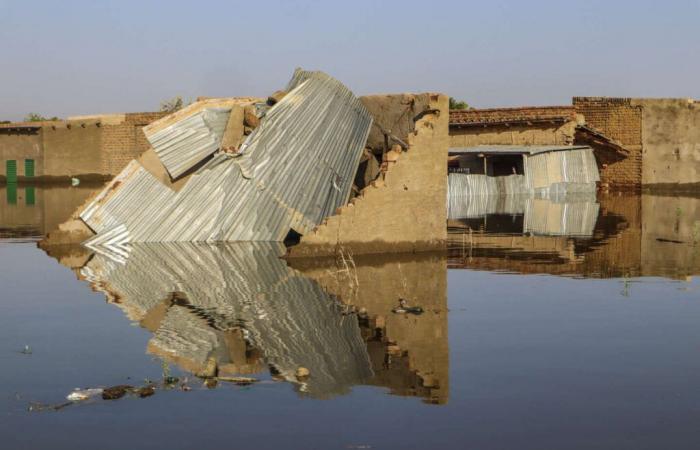The torrential rains and floods that affected the African continent this summer have caused 341 deaths and 1.5 million homeless people since July in Chad, according to a report published by the United Nations Office for the Coordination of Humanitarian Affairs (OCHA) in Chad.
“All twenty-three provinces of the country are currently affected by the flood crisis, which has become increasingly recurrent in recent years”according to this report which states that “164,000 houses destroyed, 259,000 hectares of fields destroyed and 66,700 heads of livestock taken away”The Chadian government has not yet published an overall assessment of the bad weather that has been hitting this poor Sahel country for several weeks.
Last week, fourteen students and their teacher died when a school collapsed after torrential rains in Ouaddai province in semi-arid eastern Chad. In mid-August, at least fifty-four people died in floods in Tibesti province in Chad’s desert far north.
In normal times, “rainfall hardly reaches 200 mm per year” in this mountainous region, but this climatic phenomenon occurs “every five or ten years”according to Idriss Abdallah Hassan, director of the weather observation and forecasting network at the National Meteorological Agency.
In 2022, heavy rainfall, the heaviest since the 1960s, affected around 1.4 million people in nineteen of the country’s twenty-three provinces and triggered a major humanitarian crisis, worsening food insecurity among its inhabitants. The storms destroyed more than 350,000 hectares of crops, caused the loss of 20,000 livestock and caused considerable damage to thousands of homes, schools, health centres and public infrastructure, according to a report published at the time by OCHA.
Read also: Devastating floods in West Africa worsened by climate change
Add to your selections
“Climate crisis”
Last week, the UN warned of the impact “torrential rains and severe flooding” in the region, calling for “immediate action and sufficient funding” to face the “climate crisis”.
The summer of 2024 was the hottest ever recorded on the planet, where temperature records have been continuing unabated for over a year, with its procession of heatwaves, droughts and deadly floods fueled by relentless global warming.
Read also | Article reserved for our subscribers Summer 2024 is the hottest ever recorded worldwide
Add to your selections
In Niger, torrential rains have caused at least 273 deaths and 700,000 homeless people since June, according to figures published by the authorities in early September. “hundreds of thousands of children” in Niger, Nigeria and Mali have been forced to leave their homes before the start of the school year due to torrential rains and flooding in recent weeks, according to the NGO Save the Children. Nearly 950,000 people have been displaced in these three countries – 649,184 in Niger, 225,000 in Nigeria and 73,778 in Mali –, according to the same source.
In South Sudan, one of the world’s poorest countries, more than 700,000 people have been affected by severe flooding, according to a report released on September 5 by OCHA. Torrential rains and violent windstorms have also affected 562,000 people in Yemen in recent weeks, according to the International Organization for Migration (IOM).
Follow us on WhatsApp
Stay informed
Receive the essential African news on WhatsApp with the “Monde Afrique” channel
Join
In the north of the continent, torrential rains accompanied by violent floods have left at least eleven dead and nine missing since Friday in usually semi-arid areas of southern Morocco. The volume of precipitation recorded in two days is equivalent to that which these regions normally experience during an entire year, according to Moroccan authorities. This climatic phenomenon “exceptional” also affected neighboring Algeria.






